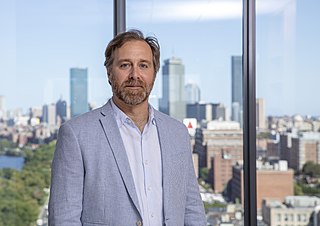
Retirement is the withdrawal from one's position or occupation or from one's active working life. A person may also semi-retire by reducing work hours or workload.

A pension is a fund into which a sum of money is added during an employee's employment years and from which payments are drawn to support the person's retirement from work in the form of periodic payments. A pension may be a "defined benefit plan", where a fixed sum is paid regularly to a person, or a "defined contribution plan", under which a fixed sum is invested that then becomes available at retirement age. Pensions should not be confused with severance pay; the former is usually paid in regular installments for life after retirement, while the latter is typically paid as a fixed amount after involuntary termination of employment before retirement.
An index fund is a mutual fund or exchange-traded fund (ETF) designed to follow certain preset rules so that the fund can track a specified basket of underlying investments. While index providers often emphasize that they are for-profit organizations, index providers have the ability to act as "reluctant regulators" when determining which companies are suitable for an index. Those rules may include tracking prominent indexes like the S&P 500 or the Dow Jones Industrial Average or implementation rules, such as tax-management, tracking error minimization, large block trading or patient/flexible trading strategies that allow for greater tracking error but lower market impact costs. Index funds may also have rules that screen for social and sustainable criteria.
A mutual fund is a professionally managed investment fund that pools money from many investors to purchase securities. The term is typically used in the United States, Canada, and India, while similar structures across the globe include the SICAV in Europe and open-ended investment company (OEIC) in the UK.
Corporate governance is the collection of mechanisms, processes and relations used by various parties to control and to operate a corporation. Governance structures and principles identify the distribution of rights and responsibilities among different participants in the corporation and include the rules and procedures for making decisions in corporate affairs. Corporate governance is necessary because of the possibility of conflicts of interests between stakeholders, primarily between shareholders and upper management or among shareholders.
An activist shareholder is a shareholder that uses an equity stake in a corporation to put pressure on its management. A fairly small stake may be enough to launch a successful campaign. In comparison, a full takeover bid is a much more costly and difficult undertaking. The goals of activist shareholders range from financial to non-financial. Shareholder activists can address self-dealing by corporate insiders, although large stockholders can also engage in self-dealing to themselves at the expense of smaller minority shareholders.
The Government Pension Fund of Norway comprises two entirely separate sovereign wealth funds owned by the government of Norway.

The California Public Employees' Retirement System (CalPERS) is an agency in the California executive branch that "manages pension and health benefits for more than 1.6 million California public employees, retirees, and their families". In fiscal year 2012–13, CalPERS paid over $12.7 billion in retirement benefits, and in fiscal year 2013 it is estimated that CalPERS will pay over $7.5 billion in health benefits.
Robert Charles Pozen known as "Bob" is an American financial executive with a strong interest in public policy. Pozen currently teaches executives about how to be more productive and serves as an executive coach and mentor, www.bobpozen.com. He is the former chairman of MFS Investment Management, the oldest mutual fund company in the United States. Previously, Pozen was the President of Fidelity Investments. As of 2020 he is a senior lecturer at MIT Sloan School of Management, and a senior fellow at the Brookings Institution.

BlackRock, Inc. is an American multinational investment management corporation based in New York City. Founded in 1988, initially as a risk management and fixed income institutional asset manager, BlackRock is the world's largest asset manager, with just over $9 trillion in assets under management as of July 2021. BlackRock operates globally with 70 offices in 30 countries and clients in 100 countries.
In Australia, superannuation, or just "super", is compulsory for all people who have worked and reside in Australia. The balance of a person's superannuation account, or for many people, accounts, is then used to provide an income stream when retiring. Federal law dictates minimum amounts that employers must contribute to the super accounts of their employees, on top of standard wages or salaries.

There are two basic financial market participant categories, Investor vs. Speculator and Institutional vs. Retail. Action in financial markets by central banks is usually regarded as intervention rather than participation.

Socially responsible investing (SRI), social investment, sustainable socially conscious, "green" or ethical investing, is any investment strategy which seeks to consider both financial return and social/environmental good to bring about social change regarded as positive by proponents. Socially responsible investments often constitute a small percentage of total funds invested by corporations and are riddled with obstacles.
The Children’s Investment Fund Management (UK) LLP (TCI) is a London‐based hedge fund management firm founded by Chris Hohn in 2003 which manages The Children’s Investment Master Fund. TCI makes long‐term investments in companies globally. The management company is authorized and regulated in the United Kingdom by the Financial Conduct Authority. Its holding company is TCI Fund Management Limited, based in the Cayman Islands.
The Interfaith Center on Corporate Responsibility (ICCR) is an association advocating for corporate social responsibility. Its 300 member organizations comprise faith communities, asset managers, unions, pensions, NGOs and other investors. ICCR members engage hundreds of corporations annually in an effort to foster greater corporate accountability. ICCR's members file shareholder resolutions on issues such as climate change, human rights, corporate governance, financial practices, and other social and environmental concerns. The organization was founded in 1971.

A sovereign wealth fund (SWF), sovereign investment fund, or social wealth fund is a state-owned investment fund that invests in real and financial assets such as stocks, bonds, real estate, precious metals, or in alternative investments such as private equity fund or hedge funds. Sovereign wealth funds invest globally. Most SWFs are funded by revenues from commodity exports or from foreign-exchange reserves held by the central bank. By historic convention, the United States' Social Security Trust Fund, with US$2.8 trillion of assets in 2014, and similar vehicles like Japan Post Bank's JP¥200 trillion of holdings, are not considered sovereign wealth funds.

Alberta Investment Management Corporation (AIMCo) is a Canadian Crown corporation and institutional investor established to manage several public funds and pensions headquartered in Edmonton, Alberta. AIMCo was established by an Act of the Legislative Assembly of Alberta in 2008 under the government of Progressive Conservative Premier Ed Stelmach.
Environmental, Social, and Corporate Governance (ESG) is an evaluation of a firm’s collective conscientiousness for social and environmental factors. It is typically a score that is compiled from data collected surrounding specific metrics related to intangible assets within the enterprise. It could be considered a form of corporate social credit score. Research shows that such intangible assets comprise an increasing percentage of future enterprise value. While there are many ways to think of intangible asset metrics, these three central factors together, ESG, comprise a label that has been adopted throughout the United States financial industry. They are used for a myriad of specific purposes with the ultimate objective of measuring elements related to sustainability and societal impact of a company or business.
ShareAction is a registered charity that promotes Responsible Investment.

David H. Webber is the author of The Rise of the Working Class Shareholder: Labor's Last Best Weapon and Associate Dean for Intellectual Life at Boston University School of Law, where he writes about shareholder activism and litigation.







